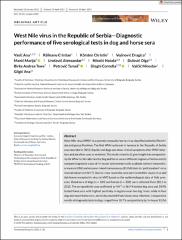West Nile virus in the Republic of Serbia—Diagnostic performance of five serological tests in dog and horse sera

View/
Date
2022Author
Vasić, Ana
Raileanu, Cristian
Körsten, Christin
Vojinović, Dragica
Manić, Marija
Urošević, Aleksandar
Nikolić, Nataša
Dulović, Olga
Birke, Andrea Tews
Petrović, Tamaš
Silaghi, Cornelia
Valčić, Miroslav
Gligić, Ana
Metadata
Show full item recordAbstract
West Nile virus (WNV) is a zoonotic mosquito-borne virus classified as family Flaviviridae and genus Flavivirus. The first WNV outbreak in humans in the Republic of Serbia was recorded in 2012. Equids and dogs can show clinical symptoms after WNV infection and are often used as sentinels. This study aimed to (i) give insight into seropositivity forWNV in clinically healthy dog and horse sera in different regions of Serbia and (ii) compare diagnostic value of ‘in-house’ and commercially available indirect immunofluorescence (IFA) and enzyme-linked immunoassay (ELISA) tests to ‘gold standard’ virus neutralization test (VNT). Due to cross-reactivity, sera were tested for Usutu virus and tick-borne encephalitis virus in VNT based on the epidemiological data of field presence. Blood sera of dogs (n = 184) and horses (n = 232) were collected from 2011 to 2013. The seropositivity was confirmed by VNT in 36.9 per cent tested dog sera and 34.9per cent tested horse sera with highest positivity in regions near two big rivers, while in four dog and seven horse sera, positivity resulted from Usutu virus infection. Comparative results of diagnostic tests in dogs ranged from 18.7 per cent seropositivity by ‘in-hou to 31.9per cent by commercially available ELISA. In horses, seropositivity ranged from 36.2per cent by ‘in-house’ IFA to 32.5per cent by commercially available IFA and from 26.3per cent by ‘in-house’ IgG ELISA to 20.9per cent by commercially available ELISA. There were no statistically significant differences according to the McNemar test between ‘in-house’ and commercially available IFA and ELISA test in horse sera, while the same was not true for two ELISAs used in dog sera (χ2 = 8.647, p = .003). Established seropositivity in dogs and horses was in accordance with the epidemiological situation and WNV spread in the Republic of Serbia and proven Usutu virus co-circulation. ‘In-house’ tests remain a valuable tool in early diagnostics of WNV. KEYWORDS dogs, horses, Serbia, serology, West Nile virus
